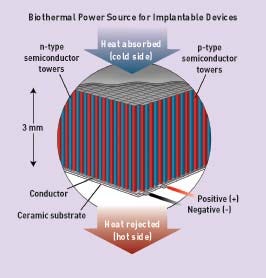Biomedical Device Maker Teams with NASA to Develop Nano-Sized Biothermal Battery
October 6, 2004
Originally Published MPMN October 2004
INDUSTRY NEWS
Biomedical Device Maker Teams with NASA to Develop Nano-Sized Biothermal Battery
Corinne Litchfield
|
Biophan’s biothermal battery is powered by body heat differentials. The battery is designed for use in implantable medical devices (click to enlarge). |
Biophan Technologies Inc. (Rochester, NY; www.biophan.com) recently announced an agreement between its TE-Bio subsidiary and NASA for the joint development of high-density, nanoengineered thermoelectric materials for use with implantable medical devices. The agreement was signed on August 17. Research will be conducted at the NASA Ames Research Center for Nanotechnology at Moffett Field in California.
Currently, implantable electromedical devices have to be replaced every few years due to short battery life. Biophan’s aim is to develop a thermoelectric power system based on temperature differentials in the human body. “By deriving power from the heat produced by the body,” says Biophan CEO Michael Weiner, “we can extend the life of these devices.” In the initial phases of the project, the company will supply parts to NASA for the construction of special test equipment. “[By teaming with NASA] we can more quickly bring these innovations to market and to NASA missions,” adds Weiner.
NASA’s experience with thermoelectric power systems includes the Voyager mission, which began in 1977. In teaming with Biophan, NASA scientists will develop miniature diagnostic sensors powered by a biothermal battery to be used on astronauts. “We are pleased to be working with Biophan on a joint research initiative to help advance the concept of an implanted biothermal source to power medical sensing and therapeutic devices,” states David Lackner, technology partnership manager at NASA Ames Research Center. “On deep-space missions, such as a trip to Mars, having efficient ways to monitor and treat astronauts can be very useful.”
In signing the agreement with NASA, Biophan is able to reduce R&D time to market and avoid expenses on cleanrooms and specialized test equipment. While NASA scientists will have rights to use the resulting technology in the space program, Biophan retains the exclusive license to a very broad patent. It will derive income from licensing fees, R&D agreements, and other resources. Possible future applications include the development of a biothermal battery that will generate adequate power for neurostimulators and pacemakers. The battery could also be used to supplement and/or recharge power sources in larger devices such as defibrillators.
Several medical device OEMs have expressed interest in the technology. “There’s a real human benefit for those individuals in need of advanced biomedical devices,” says Weiner.
Biophan Technologies develops and markets technologies designed to make biomedical devices safe, both implanted devices and those used in surgical and diagnostic procedures, and to reduce interference that these devices cause to magnetic resonance imaging (MRI) image quality.
Copyright ©2004 Medical Product Manufacturing News
You May Also Like


.png?width=300&auto=webp&quality=80&disable=upscale)
